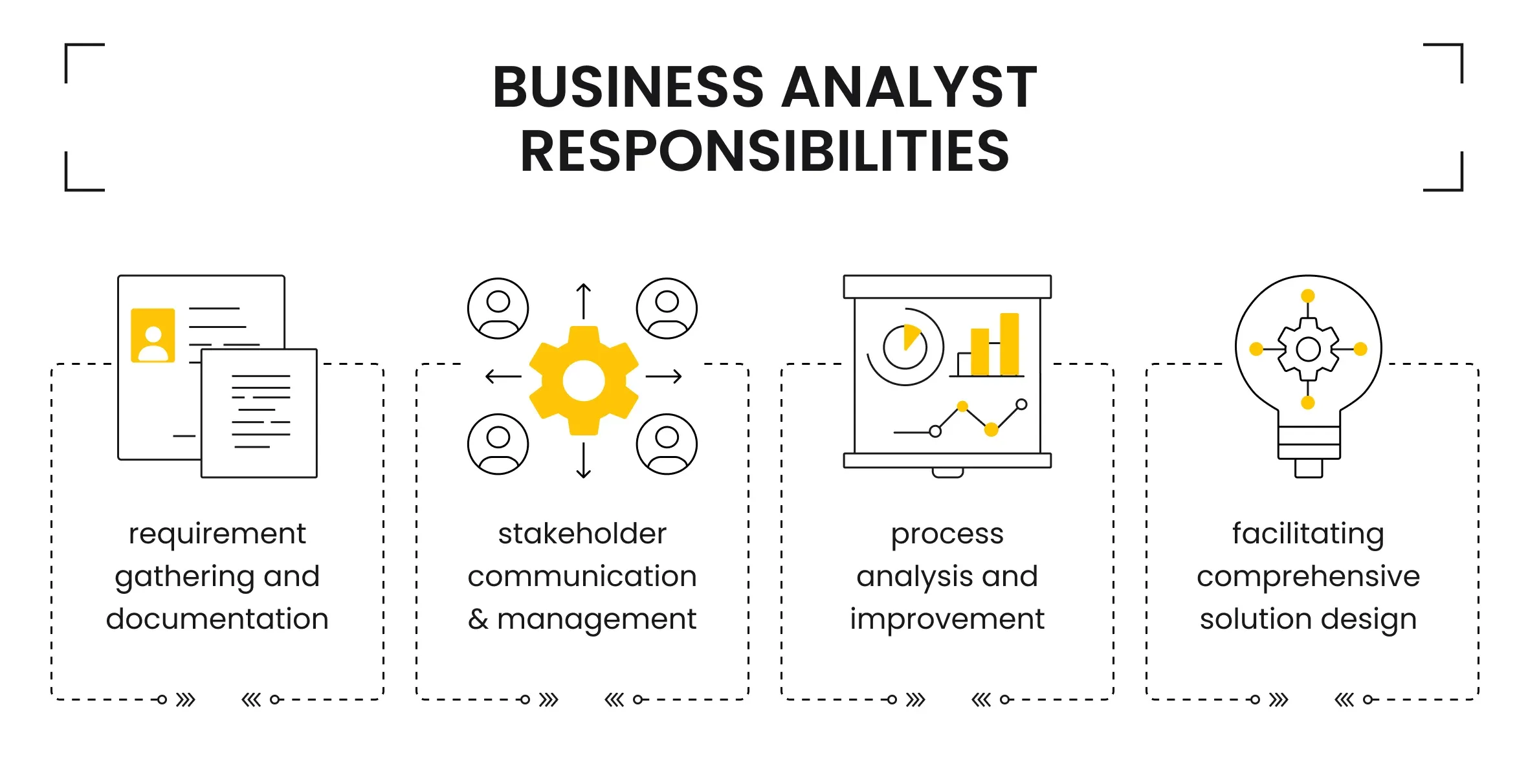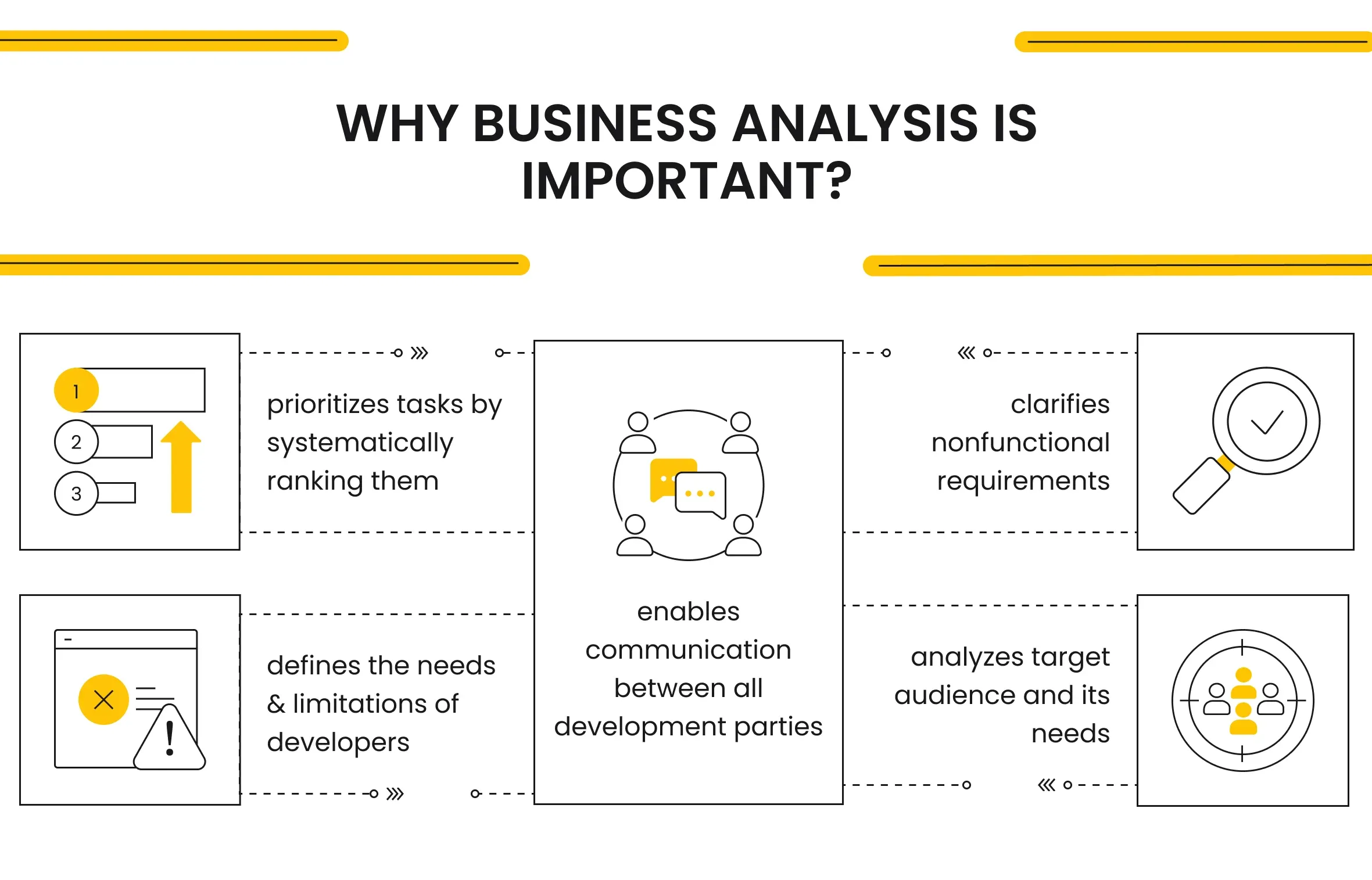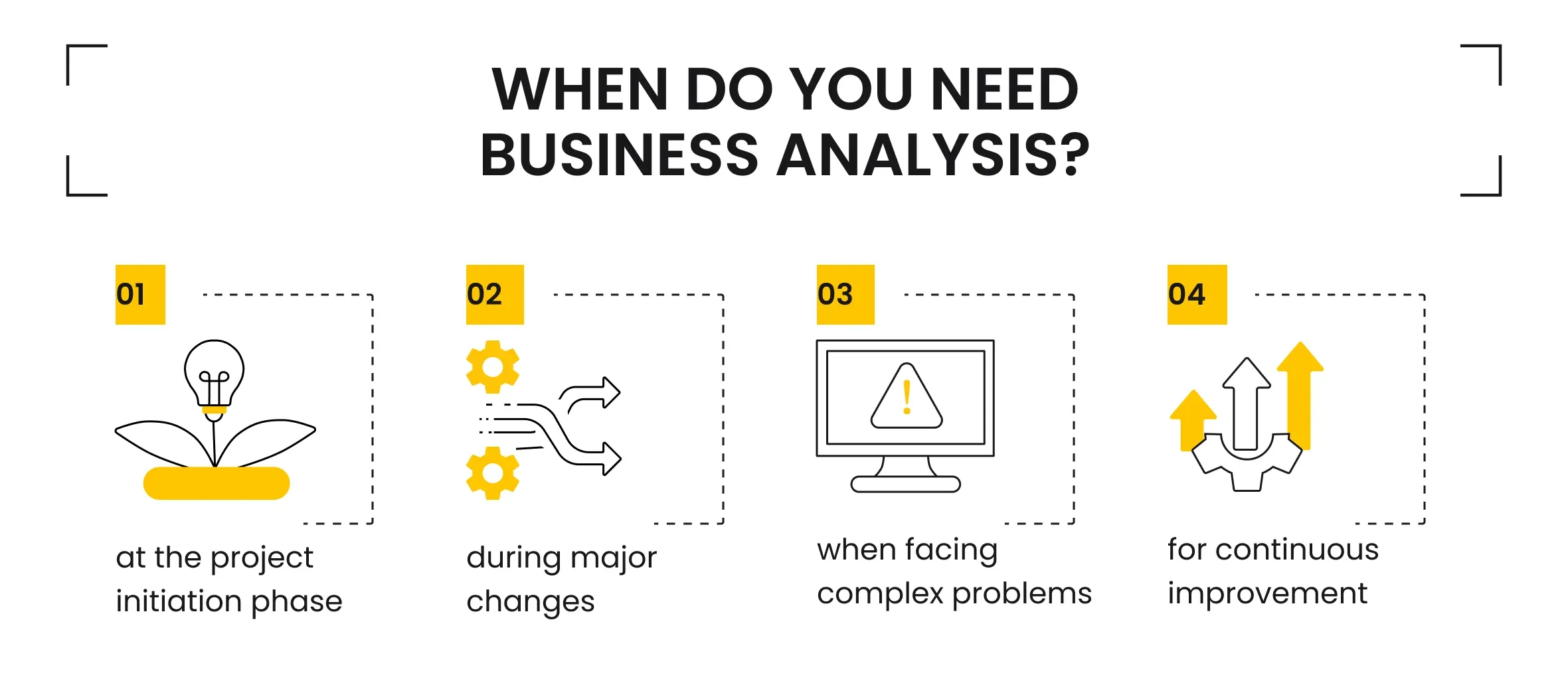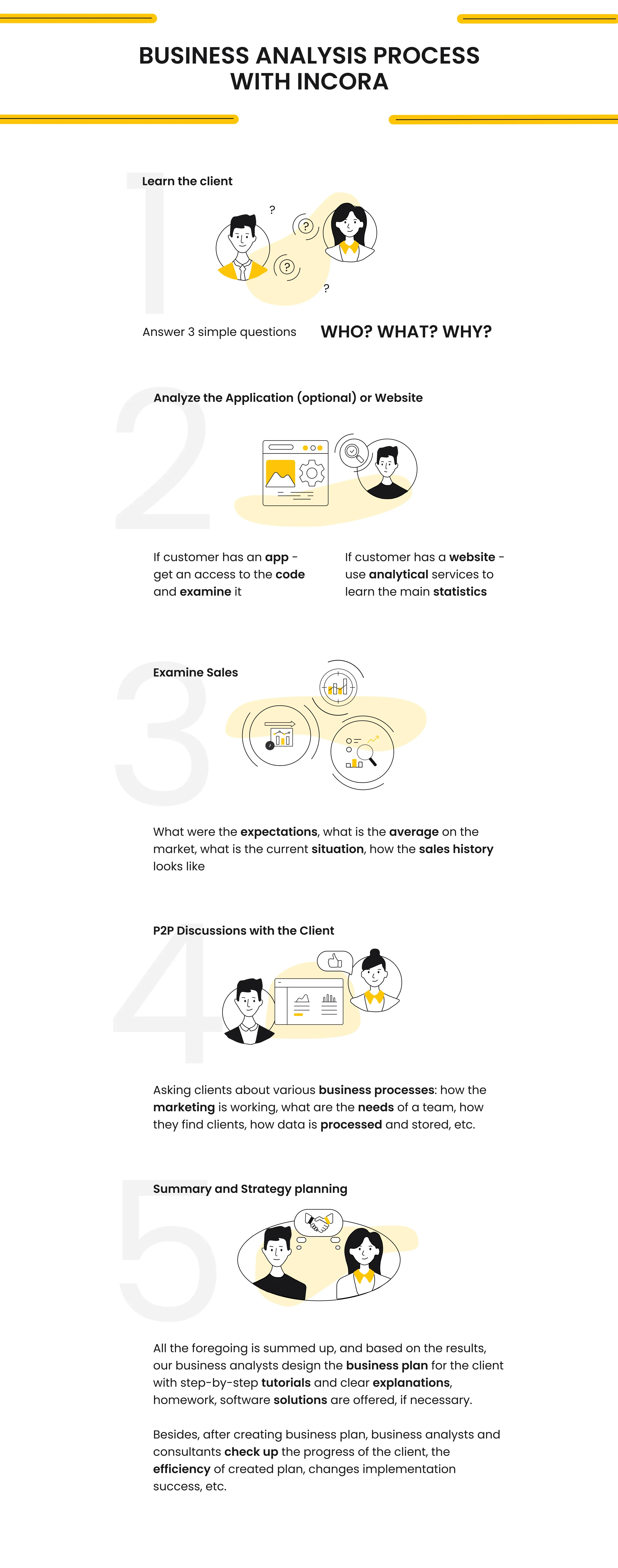Why Business Analysis is Crucial in Software Development
June 25, 2024 • 455 Views • 16 min read
Bohdan Vasylkiv
CEO & Co-Founder
Business analysis in software development is one of the most unknown software services: many startups are unaware of such positions and don’t understand why they need software business analyst services.
Nevertheless, it is hard to overestimate the role of business analyst in software development life cycle. These specialists are responsible for numerous tasks and processes and can help significantly improve the software development project, and cut the expenses.
Still, before discussing the role of a business analyst in a project, we must understand why business analysis is so crucial.
What is Business Analysis in Software Development?

BA in software development is a type of IT consulting for businesses, either unfamiliar with software development, or which lack certain skills and expertise.
The business analyst in software development plays the role of mediator between the IT and business parts. To cut a long story short, the business analysis process flow involves finding a common language between two different aspects of the software development project, explaining business goals and logic to the in-house or dedicated development team, and defining the needs and demands of development teams to the management.
However, it is just one of many software business analyst responsibilities. For instance, the business analysis process can also be engaged in budget planning, iron triangle balancing, project discovery phase, etc.
To sum up, business analyst for software development is an important role, that requires skills and experience in multiple fields, related to business software development. For a better illustration, let’s examine the core responsibilities of a BA in software development.
What Does a Business Analyst Do in Software Development?
A business analyst in software development is responsible for business requirements identification and clarification so that development teams have a clear understanding of the project.
It means, that apart from examining business processes, a BA in software development must at least know how to write certain types of documentation, and have great communication skills.
To cut a long story short, the business analysis stage constantly takes place during software development. For example, after writing documentation for developers, a BA in software development takes part in other business-related processes like communication with development teams, stakeholders, managers, etc. To simplify, the core responsibilities of a business analyst in software development life cycle are:
- Writing Software Requirement Specifications and other tech-related documentation
- Communication and management between stakeholders and development teams
- Analyzing business processes and needs
- Taking part in Solution Design and Development
Requirements Gathering and Documentation
The core role of business analyst in software development life cycle is gathering and documenting business requirements for further implementation.
It includes analyzing the current market situation, learning the user demands and experience, finding new integrations, and other ways to improve the product.
Writing SRS is another step of this process. Frankly, not every BA in software development takes care of the whole documentation. However, each software business analyst is responsible for wiring at least the nonfunctional requirements.
Nonfunctional requirements are general conceptions and assumptions, that can positively impact the business's success. Nonfunctional requirements include:
- Performance (metrics and statistics)
- Security goals (defined system and data protection goals)
- Level of usability (how user-friendly the software is)
- Software reliability (how it must behave in various circumstances)
- Maintainability (adjustment to different development processes)
- Portability (Supported operational systems and adjustment)
- Compliance (laws, regulations, restrictions, etc)
Designing clear and correct nonfunctional requirements documentation is crucial because it explains the business requirements for software development teams. As a result, having defined software expectations, developers can choose a more suited tech stack, view IT infrastructure, and plan other aspects of software development.
Stakeholder Communication and Management
Another important role of business analyst in software development life cycle is communication.
Judging from our experience, this task takes the most time of BA in software development: to understand business goals and describe them to development teams, business analysts must commonly communicate with various officers and stakeholders, discuss their ideas, process the information, and shape it into clear and understandable guides and software requirements.
Besides, business analysis in software development includes the perception of business owners or management and developers’ opinions. To make it simple, each software business analyst must be capable of translating various terms and demands from different niches into a more convenient form for each party.
Business owners can offer general ideas of how the final product must look, while developers will tell why it is impossible or unnecessary, from the technical perspective. So, a BA in software development must know how to explain each point of view to other parties.
Process Analysis and Improvement
In addition to the aforementioned, business analysis services include techniques to analyze various processes, define pitfalls and other issues, and offer solutions.
In a nutshell, business analysis in software development includes finding ways to improve the software product by gathering information about undergoing processes, processing it, and making assumptions about the application efficiency, as well as deciding what can be upgraded.
Once again, the main business analyst role in software development is to set up a communication bridge between different parties, involved in software development, and create a clear and comprehensible explanation of what should be changed to show better results, and how it can be done.
So, apart from making their assumptions, BA in software development also discusses the ideas with each party, involved in the development process: BA has to contact stakeholders to learn business goals, and development teams to understand if they are possible in terms of undergoing business processes.
Facilitating Solution Design
The final aspect, offered by all business analysis services is finding and implementing solutions, matching the defined issues.
Again, the process of designing a solution consists of a few main steps:
- BA learns the business goals
- Business analyst studies business processes
- Analysts conceptualize a probable solution
- BA discusses the possibility of embodying the solution with each party
Why Business Analysis is Important
Business analysis in software development is a crucial part, which helps define and use the project's opportunities.

The most basic role of business analyst in software development life cycle is to identify potential threats and find ways to improve the product. However, apart from these functions, a BA in software development also helps to plan the development process, achieve better performance, save costs, choose the most suited technological solutions, etc.
Eventually, each software business analyst is responsible for creating a friendly environment, by communicating with each business party and sharing its perspective with the rest of the team, so that everyone understands the main points and tasks, as well as business requirements and the possibilities to achieve them.
When Do I Need Business Analysis?
The short answer is always. It is preferred to ensure that the business analysis process flow is constant. As a result, your business analyst can analyze each aspect of the business project and find what can and should be improved.

Nevertheless, sometimes it is impossible to maintain continuous business analysis services. Thus, defining the main software development phases, when engaging software business analysts is crucial and the most beneficial, is possible.
At the Project Initiation Phase
Business analysis of new product development is one of the best possible scenarios.
When starting your new software product development, you need a BA on board. The most important role of a business analyst in a project is to find a way to turn the prototype into a full-fledged working application.
So, business analysis of new product development helps to:
- Conceptualize the idea of future products, and define core business goals and requirements
- Learn the market and target audience, its needs and demands, preferences, etc.
- Define and study the main use cases and scenarios of the product, to better know the efficiency of software, and its do’s and don’ts.
- Write clear and useful nonfunctional requirements for development teams
- Supporting the team during the development phase
To simplify it, involving BA in software development at the discovery phase is, probably, the most beneficial and efficient approach.
During Major Changes or Updates
Fortunately, apart from business analysis of new product development, business analysis services can also be applied in other circumstances like scaling the business and software, or implementing other important and scalable changes.
In such cases, business analysis solutions are almost the same as usual, yet are targeted at more specific processes. For instance, if you are implementing new changes, your software business analyst will discover all the changes and updates, their requirements, and possible effects on the software.
The business analyst role in software development is crucial, yet the responsibilities are very flexible, which makes them ideal particularly for agile software development projects.
When Facing Complex Problems
Business analysis techniques are also helpful when you face complex problems. Therefore, specialists can study them, and offer business analysis solutions to cope with issues.
All you have to do is provide hired business analysts with business goals and requirements to achieve, as well as inform them about all the problems that occurred.
After the business analysis stage, the specialists will offer you potential ways to avoid or fix the problems. Additionally, they will suggest a strategy for further development, and pinpoint the core aspects and factors to take care of.
For Continuous Improvement
Last but not least, a business analyst in software development life cycle performs all the aforesaid responsibilities, being a dedicated member of development teams until the project ends.
Once again, if you want to get the most out of business analysis techniques - you have to apply business analysis services for the full cycle of software development.
Nevertheless, one of the most critical aspects of hiring a business analyst for software development is to find a reliable and experienced specialist. The simplest and most efficient way to do it - is to cooperate with IT outsourcing companies.

IT outsourcing vendors are commonly engaged in various software development projects, and their experience can be checked by analyzing their case studies. To cut a long story short, IT vendors’ employees have a broad experience, based on their engagement in various software development projects.
Thus, it makes them ideal candidates for positions like software business analyst on demand: they have much more experience in working with different cases and technologies, resolving countless problems and issues. For more details, you are always welcome to contact us and ask whatever project-related questions.
What’s your impression after reading this?
Love it!
1
Valuable
2
Exciting
1
Unsatisfied
1
FAQ
Let us address your doubts and clarify key points from the article for better understanding.
What does a BA do in programming?
A Business Analyst (BA) in programming bridges the gap between business needs and technical solutions. They gather and analyze requirements, document processes, and communicate with stakeholders to ensure that software projects meet business objectives. BAs work closely with developers, testers, and project managers to translate business requirements into technical specifications and ensure successful project implementation.
What are the four types of business analysis?
The four types of business analysis are:
- Strategic Analysis - Focuses on high-level business goals and long-term strategies.
- Tactical Analysis - Deals with specific projects and their alignment with business strategies.
- Operational Analysis - Involves improving and optimizing day-to-day business processes.
- Analytical Analysis - Uses data and metrics to support decision-making and identify trends.
What are the stages of business analysis?
The stages of business analysis are:
- Initiation - Defining the project scope and objectives.
- Planning - Developing a detailed analysis plan and identifying stakeholders.
- Analysis - Gathering and analyzing requirements through various techniques.
- Design - Creating models and prototypes to address requirements.
- Implementation - Working with the development team to build the solution.
- Testing - Ensuring the solution meets business requirements and is defect-free.
- Evaluation - Reviewing the solution's performance and making necessary adjustments.
What is the difference between business system analyst and business analyst?
A Business Analyst (BA) focuses on understanding business needs, gathering requirements, and ensuring solutions align with business objectives. A Business Systems Analyst (BSA) combines these duties with a deeper technical focus, analyzing and designing IT systems to meet business requirements.
you may also like
Let’s talk!
This site uses cookies to improve your user experience. Read our Privacy Policy
Accept
Share this article